|
|
|
Sort Order |
|
|
|
Items / Page
|
|
|
|
|
|
|
| Srl | Item |
| 1 |
ID:
061021


|
|
|
|
|
| Publication |
Spring 2004.
|
| Description |
p187-212
|
| Summary/Abstract |
Against the background of the 1991 Gulf War and the 2003 western coalition's war against Iraq, this article will argue that interstate resource wars and armed conflicts will constitute a new threat to global security. Two different phenomena are framing the conditions for future resource wars: first, an anticipated oil supply crisis as a first consequence of the decline of global oil reserves and second, the uneven distribution of these declining resources along the North-South axis. It is argued that in response to these developments the coercive character of traditional US strategies for securing energy will intensify, and thus bears the potential to escalate into further armed conflicts. It follows from this discussion that there are only two sustainable strategies for conflict prevention: first, the reduction of the dependency on fossil fuels by developing alternative and renewable energy, and second, the pursuit of a global policy based on more equitable and controlled energy distribution.
|
|
|
|
|
|
|
|
|
|
|
|
|
|
|
|
| 2 |
ID:
061017
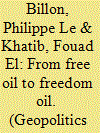

|
|
|
|
|
| Publication |
Spring 2004.
|
| Description |
p109-137
|
| Summary/Abstract |
Oil has been a major driving force behind foreign interests, regional and domestic balance of power, and territorial conflicts in the Persian Gulf. As a result of the '9/11' terrorist attacks debates on oil and the United States' security agenda have significantly shifted. If on one side, those opposing US military interventionism have argued that the 'war on terror' provided one more convenient cover for a renewed 'imperialist oil grab' in this region; on the other, links between oil and terrorism pointed at problems of governance in oil-producing countries. As the 'war on terror' became justified as a 'war of liberation' against oil-funded dictators, the US portrayed its foreign policy as shifting from ensuring free access to oil for the world market, to ensuring that oil is delivering 'freedom' to local populations. Although engaging the crucial issue of oil governance, there is yet little evidence given the number of war victims and potential vested interests that a US policy shift from 'free oil' to 'freedom oil' is genuine and viable.
|
|
|
|
|
|
|
|
|
|
|
|
|
|
|
|
| 3 |
ID:
061005
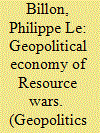

|
|
|
|
|
| Publication |
2004.
|
| Description |
p1-28
|
| Summary/Abstract |
Geopolitical concerns about so-called 'resource wars' have mostly focused on international resource competition, and the vulnerability of resource supply. This article presents an alternative view emphasizing the political and economic vulnerabilitites of resource-dependent states in relation to resource-linked armed conflicts. It then outlines how the geopolitics of resource competition, the history, identity formation, political economy, and characteristics of resource exploitation, as well as the financial opportunities afforded in part by businesses to belligerents can help to understand the geographies of 'resources wars'. Finally, the study suggests that curtailing resource access by belligerents can assist in the termination of conflicts, but that long-term solutions pass through fairer and more accountable political economy of internationally traded resources at both a domestic and global level.
|
|
|
|
|
|
|
|
|
|
|
|
|
|
|
|
| 4 |
ID:
061022


|
|
|
|
|
| Publication |
Spring 2004.
|
| Description |
p213-241
|
| Summary/Abstract |
Sierra Leone provides an example of a current geopolitical reality in which both a state and an insurrection developed similar characteristics of predatory behaviour as they competed for a dispersed, accessible resource - in this case, diamonds. A conflict of this type can be sustained for extended periods if it is part of a larger global system that provides both markets for the resource and weapons. Unfortunately, the two contenders in this contest, offlcial state and insurgency, have used creative strategies to stave off defeat, initiate new rounds of combat and so perpetuated the ongoing violence and destruction. The civilian population caught in this kind of cauldron has few choices - participate in the carnage, flee, or suffer brutality. Unless the resource itself is exhausted, the termination of a resource-based confrontation is likely to come from the involvement of the international community, including the UN, individual governments, and transnational companies. A combination of interventions such as boycotts, trade restrictions, peacekeeping efforts and even a military role may be required to terminate resource wars. Yet even now, when the conflict in Sierra Leone seems to have been resolved, the social and economic changes brought about by the war and circumstances that prevail in the wider region make it difficult for the country to recreate the peace and security of past decades.
|
|
|
|
|
|
|
|
|
|
|
|
|
|
|
|
| 5 |
ID:
061018


|
|
|
|
|
| Publication |
Spring 2004.
|
| Description |
p138-160
|
| Summary/Abstract |
In this article I examine the way in which resource conflict in the Caspian Sea Basin has become entwined in the development of geopolitical thought and ideas since the late nineteenth century. I argue that Mackinder's inclusion of the Caspian in his original pivot was significant and that because of its considerable strategic importance control of the region was seen as crucial to all sides in both the First World War and the Second World War. The struggle for control of the Caspian bolstered Mackinder's ideas which were influential in the development of Cold War geopolitics. Since the collapse of the Soviet Union the desire to control the 'heartland' has been played out via the control of the region's energy resources.
|
|
|
|
|
|
|
|
|
|
|
|
|
|
|
|
| 6 |
ID:
061007
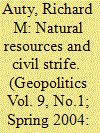

|
|
|
|
|
| Publication |
Spring 2004.
|
| Description |
p29-49
|
| Summary/Abstract |
This article explains why resource-rich countries tend to spawn predatory political states that distort the economy and create four of Collier's conditions for civil strife, namely a growth collapse, low educational attainment, a large cohort of unemployed young males and high resource dependence. Yet, the article also shows that these conditions characterize the resource-rich countries as a group, and most have avoided civil strife. The second part of the study therefore identifies the specific properties of natural resources associated with conflict, namely socio-economic linkages, the ratio of commodity value to weight and relative location. However, this manifestation of the resource curse, like others, is not a deterministic phenomenon so that domestic and global policies can limit resource-driven conflict.
|
|
|
|
|
|
|
|
|
|
|
|
|
|
|
|
| 7 |
ID:
061016
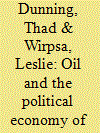

|
|
|
|
|
| Publication |
Spring 2004.
|
| Description |
p81-108
|
| Summary/Abstract |
Empirical studies have found a strong positive association between dependence on petroleum exports and the incidence and duration of civil war, yet these analyses remain largely bounded within a national level of analysis. Our case study of Colombia suggests that the international and transnational dimensions of oil, in particular the role of foreign direct investment and the centrality of global geopolitics, have an important influence on resource conflict. Processes of conflict generated by local productive activities pose perceived and real threats to supply, generating new security arrangements that reshape the material and discursive strategies of local and transnational actors. The linkages and interactions between local, national and transnational actors are therefore crucial to understanding the relationship between oil and conflict.
|
|
|
|
|
|
|
|
|
|
|
|
|
|
|
|
| 8 |
ID:
061009
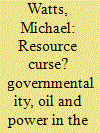

|
|
|
|
|
| Publication |
Spring 2004.
|
| Description |
p50-80
|
| Summary/Abstract |
What might it mean to say that resources, and resource-dependency, have consequences for the conduct of politics? This article explores the research conducted under the sign of resource politics associated with the work of Michael Ross, Paul Collier and others through a detailed examination of the political economy of oil in Nigeria. Much of the resource politics work suffers from either too strong a commodity-determinism or an insufficient attention to the ways in which specific resource characteristics matter analytically with respect to politics, rule and conflict. I approach the oil question in Nigeria by using the work of Michel Foucault and Nikolas Rose and by identifying three different forms of governable space and rule (the chieftainship, the ethnic minority, and the nation state) associated with oil-based capitalism. Governable spaces as forms of rule, identity and territoriality are not necessarily fully governable (they may be almost ungovernable and wracked by internal dissent and conflict) and may not be compatible among themselves, but rather work against one another in complex and contradictory ways.
|
|
|
|
|
|
|
|
|
|
|
|
|
|
|
|
| 9 |
ID:
061019


|
|
|
|
|
| Publication |
Spring 2004.
|
| Description |
p161-186
|
| Summary/Abstract |
The management of resources can shape or alleviate conflict. This article examines the case of the Caspian Sea as littoral states vie for oil fields in the transboundary water body. These five states have promoted conflicting proposals for the division of Caspian resources and are staking their claims through a mix of diplomatic efforts, international agreements, commercial contracts and militarization. Geoeconomic power has not fully surpassed more traditional, military control of territory in this context which continues to be complex on several geopolitical scales.
|
|
|
|
|
|
|
|
|
|
|
|
|
|
|
|
|
|
|
|
|